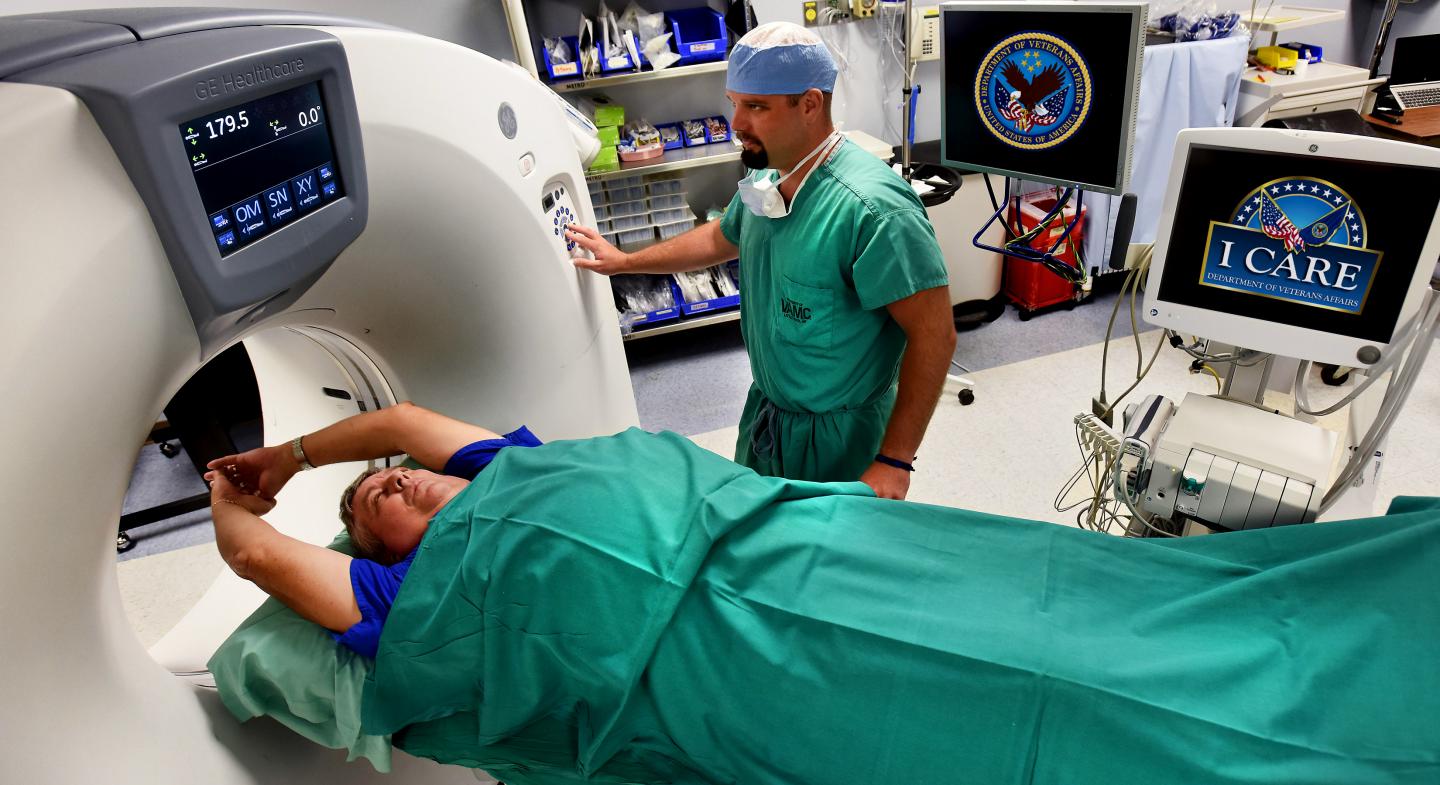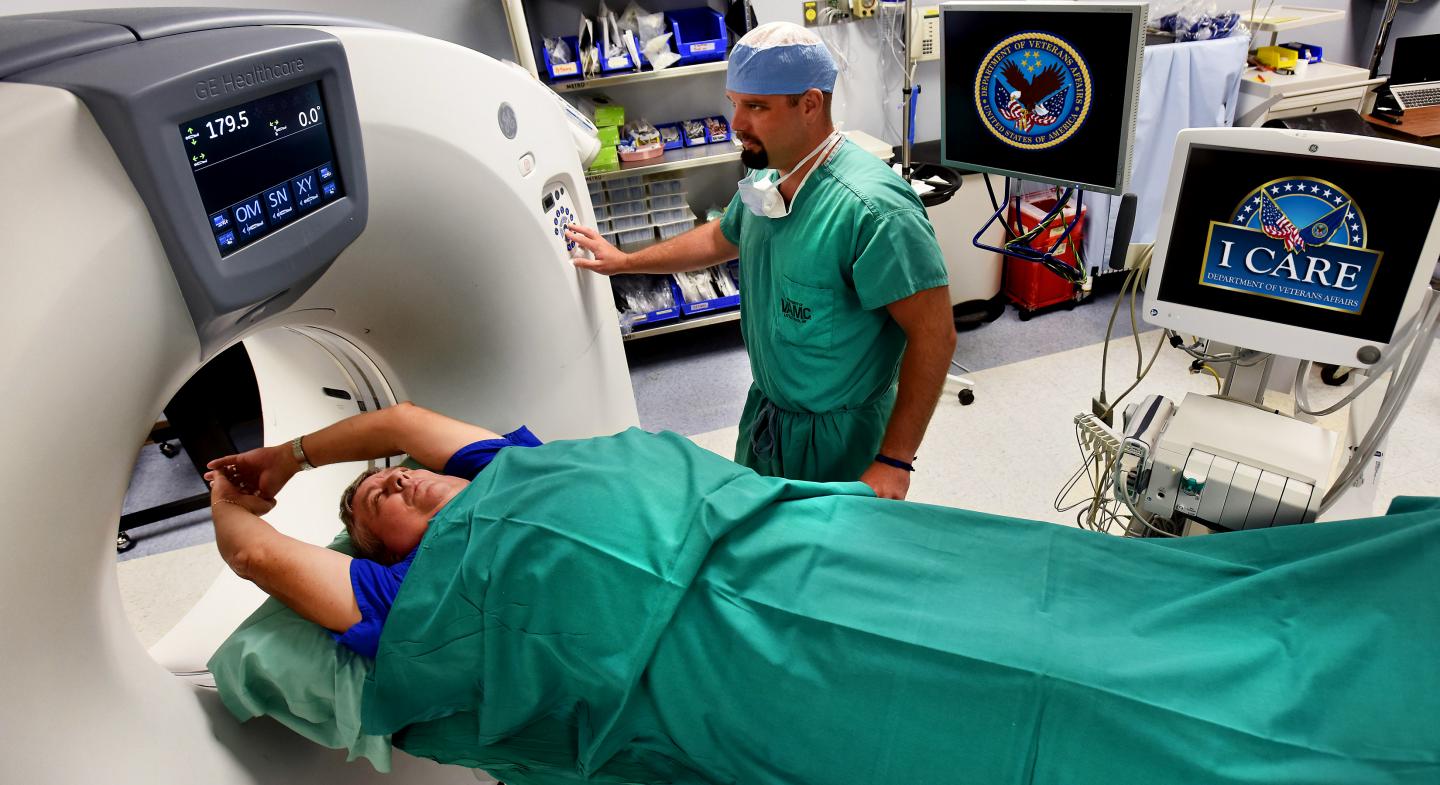
Credit: VA photo by Jeff Bowen, for illustrative purposes only
Regular cancer screenings can lower the chance of death from lung cancer. But they cannot reduce the risk of developing lung cancer for people who smoke. Patients seem to be confused about the actual benefits and limitations of lung cancer screenings, according to a study by the VA Center of Innovation for Veteran-Centered and Value-Driven Care in Seattle.
Researchers asked smokers a series of questions about smoking and lung cancer screening. Their answers showed that most patients were mistaken about the benefits of such screenings and smoking in general. Only 7 percent of patients answered all five questions correctly.
In light of these findings, Dr. Jaimee L. Heffner, lead author on the paper, emphasized the importance of communicating to patients the importance of quitting rather than just relying on screenings to protect them from cancer. "Quitting smoking is by far the most important thing a person can do to prevent lung cancer as well as a host of other diseases caused by tobacco use, and it's important that this message doesn't get lost in the discussion of lung cancer screening," he said. Heffner, with the Fred Hutchinson Cancer Research Center in Seattle, collaborated with the VA team on the study.
The results appeared online June 7, 2018, in the Annals of the American Thoracic Society.
In 2011, the National Cancer Institute (part of the National Institutes of Health) released the results of its National Lung Screening Trial. The trial screened more than 53,000 current or former heavy smokers for lung cancer using either a standard chest X-ray or low-dose computed tomography. LDCT uses X-rays to take multiple scans of the entire chest, providing a more detailed image of the lungs than a single chest X-ray.
The study revealed that patients who had LDCT scans had a 15 to 20 percent lower risk of dying from lung cancer than those who had a standard chest X-ray. By giving a more complete picture of the chest and lungs, LDCT gives doctors a chance to catch and treat lung cancer more effectively than the old method.
As a result of this study, more LDCT lung cancer screenings have been implemented nationwide, including in VA. But while this type of screening can reduce deaths from lung cancer, it is unclear how well patients understand the benefits and limitations of LDCT scans.
To test patients' actual knowledge about lung cancer, the researchers surveyed 83 smokers after they had an LDCT screening at one of four Veterans Affairs medical centers. Each participant was asked five questions:
1. Does having a lung cancer screening test decrease your chances of getting lung cancer? (Correct answer: No.)
2. Which disease is the leading cause of death in Americans who smoke cigarettes? (Correct answer: Heart disease [a list of diseases was provided].)
3. True or false: If nothing abnormal or suspicious is found on your lung cancer screening test, it means you are safe from lung cancer for at least 12 months. (Correct answer: False.)
4. True or false: All nodules or spots found in the lungs eventually grow over time to be life threatening. (Correct answer: False.)
5. For people over age 55 who are current smokers, which is more likely to prevent the most premature deaths–lung cancer screening or quitting smoking? (Correct answer: Quitting smoking.)
Almost all participants got at least one answer wrong. For the first question, 39 percent answered incorrectly. The majority, 66 percent, got question two wrong. Thirty-nine percent answered question 3 wrong, and 49 percent answered question four wrong. Perhaps most disturbing, nearly half (47%) answered the last question incorrectly, meaning they thought lung cancer screenings were at least as good as, if not better than, quitting smoking as a way of protecting against death.
Along with these five questions, the researchers also quizzed participants on basic health literacy. Unsurprisingly, participants with lower general knowledge about health and medicine got more questions wrong on the screening survey.
The results confirm the findings from a 2015 study by the same researchers. That study found that many smokers may interpret lung cancer screenings as a way of avoiding the harms of smoking. For some smokers, screenings were even shown to lower their motivation to quit because they believed that the tests protected them from the ills of smoking.
The researchers conclude that patients overestimate the protective nature of lung cancer screenings against cancer. "Our results illustrate just how wide a gap exists between the expectations and the reality of lung cancer screening benefits among some groups of current smokers," they write.
One reason for this disconnect may be a misunderstanding of the difference between cancer mortality–the chances of dying from lung cancer–and risk–the chances of getting cancer because of smoking. While LDCT screening can lower mortality rates or smokers, it does nothing to lower their chances of getting cancer. Quitting smoking is the single most effective way to do that.
Another reason for this misconception may be psychological, say the researchers. Believing that lung cancer screenings have a protective value on par with quitting may be a defensive justification by patients who don't want to quit. For these smokers, education alone may not be enough to make them understand their cancer risks.
In light of these results, the researchers believe that more efforts within VA are needed to help patients understand what LDCT screenings can and cannot do. They explain, "Our findings suggest that messages about benefits and limitations of LDCT for lung cancer screening are either not being provided or are not being actively received and/or recalled." To make sure patients are as informed as possible, health care providers should regularly check patients' knowledge as part of the decision-making process, they suggest.
###
Media Contact
Daniel E. Herrigstad
[email protected]
503-402-2975
@VAresearch
http://www.va.gov/
Original Source
https://www.research.va.gov/currents/0718-Smokers-hazy-on-actual-benefits-of-lung-cancer-screenings.cfm





